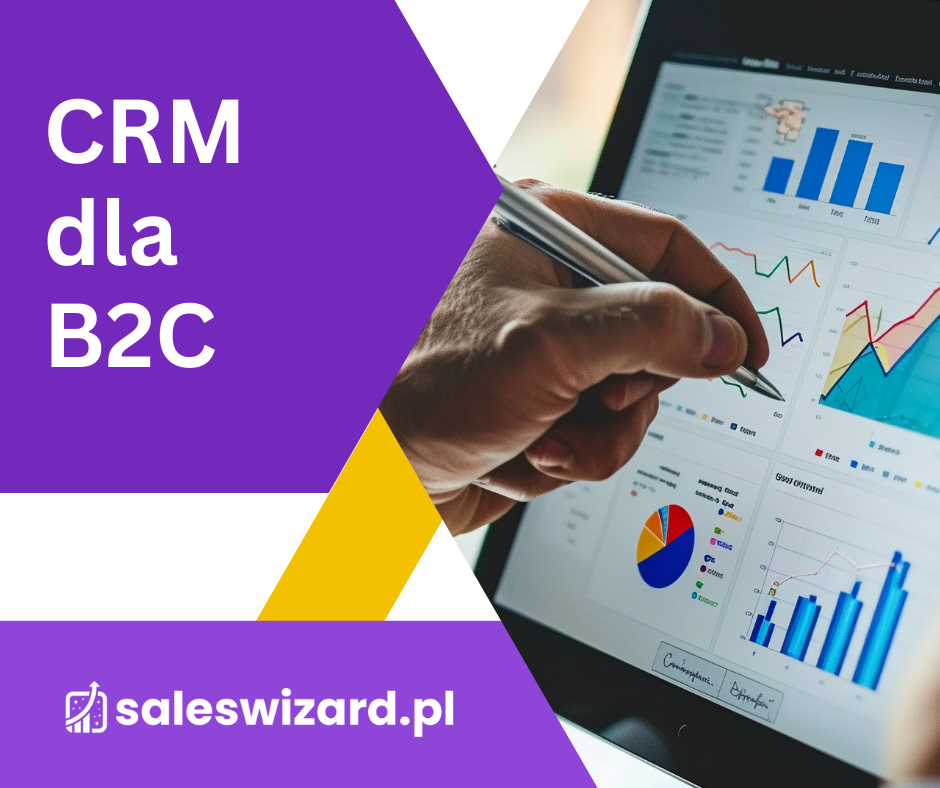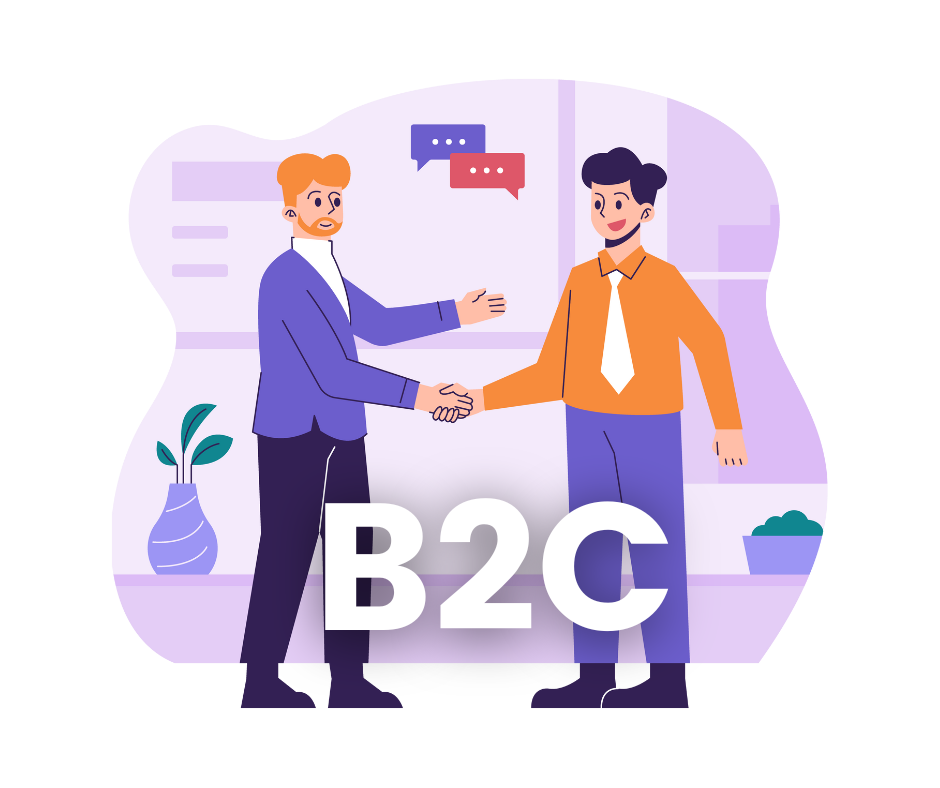CRM for B2C
In the fast-paced world of sales and customer service, CRM (Customer Relationship Management) systems are becoming an indispensable tool for B2C companies. They allow to effectively manage customer relationships, personalize communication and increase sales by automating processes. With CRM, companies can track the history of customer interactions, analyze customer behavior and tailor offers to meet customer needs.
What kind of CRM for B2C?
A CRM for B2C needs to support mass yet personalized communication, so features such as marketing automation (customer segmentation, email/SMS campaigns, retargeting), lead and customer management (interaction tracking, scoring, profiling) and customer service through chatbots, ticketing systems and social media integration are key. Also important is analytics and reporting to track customer behavior and measure campaign effectiveness. Today’s CRMs offer an omnichannel model, combining communication via email, phone, chat and social media, and through AI mechanisms allow for dynamic personalization of offers and recommendations. Sales automation, in turn, streamlines workflows, follow-ups and reminders, increasing the effectiveness of sales efforts.
- Handling leads and sales opportunities
- Task automation
- AI and chatbot support in customer service
CRM supports B2C relationships
CRM supports B2C relationships by automating communication, personalizing offers and increasing customer engagement.



Automations in CRM
How can CRM help B2C relationships?
CRM in B2C enables more effective customer relationship management through automation, personalization and interaction analysis. Key benefits include:
✅Personalization of communications – The CRM segments customers according to their preferences, purchase history and behavior, allowing customization of offers and marketing campaigns.
✅ Automation of customer service – The system enables rapid response to inquiries through chatbots, automatic responses and integration with various communication channels (email, social media, phone).
✅ Better after-sales service – CRM allows you to track your purchase and request history, making it easier to resolve issues and increase customer satisfaction.
✅ Customer behavior analysis – CRM analytical tools help identify trends, anticipate customer needs and optimize offerings, increasing sales and loyalty.
✅ Retention and loyalty programs – CRM allows you to automatically send discounts, product reminders and build long-term relationships through engaging loyalty programs.

Key integrations in B2C
We continue to develop SalesWizard integrations with the most popular IT services that support B2C companies.











Key problems in B2C that CRM solves
Difficulty in managing a large number of leads (requests)
B2C companies, especially those operating in e-commerce or services, generate thousands of leads per month. Without the right tools, it is difficult to effectively analyze, prioritize and convert them into paying customers.
Solution:
- CRM automates the lead management process by scoring (assessing contact quality), segmenting and assigning leads to appropriate follow-up campaigns. This allows sales and marketing teams to focus on the most promising customers.
Lack of a standardized bidding process
In many B2C companies, the quoting process is unstructured and depends on the individual actions of salespeople. Bids are prepared manually, leading to errors, inconsistent pricing and extended response times to customer inquiries. In addition, the lack of a central bidding system makes it difficult to monitor the conversion and effectiveness of individual bids.
Solution:
- CRM enables standardization of the quotation process through ready-made quotation templates, dynamic price calculators and automatic document generation. The system allows quick matching of proposals to customers based on their purchasing history and preferences. In addition, the CRM tracks the status of each offer, enabling analysis of effectiveness and automatic reminders to customers, which increases the chances of finalizing a deal. This makes the bidding process fast, consistent and efficient.
Lack of a centralized contact base - customers and sales opportunities
In many B2C companies, customer data is scattered – stored in various Excel sheets, emails, vendor notes or accounting systems. The lack of a unified database makes it difficult to access information, causes duplication of data and leads to inconsistent communication. This results in low sales effectiveness, lack of personalization of offers and customer service problems.
Solution:
- The CRM centralizes all customer data in one place, creating a complete customer profile with history of interactions, purchases, service requests and preferences. This gives each department - sales, marketing and customer service - access to up-to-date and consistent information, making it easier to personalize communications and streamline business processes. In addition, automatic deduplication and customer segmentation allow better management of the database and increase the effectiveness of sales and marketing activities.
Lack of innovation and AI prolongs company processes
In many B2C companies, sales, marketing and service processes are still done manually or with outdated tools. The lack of automation and artificial intelligence leads to slower customer service, delays in quotations, poor personalization of communications and lack of effective data analysis. This wastes time, increases operating costs and reduces the company’s competitiveness.
Solution:
- CRM integrated with AI accelerates and automates key business processes. Intelligent algorithms can anticipate customer needs, recommend products, personalize offers in real time and optimize marketing campaigns. Workflow automation reduces time-consuming tasks such as manual data entry, responding to inquiries and analyzing campaign results. As a result, the company works faster, more efficiently and can focus on building customer relationships instead of routine tasks.
Non-scalable customer data
As a B2C company grows, the number of customers, transactions and interactions increases, and traditional data storage systems are no longer efficient. Data is scattered, difficult to access and often needs to be updated manually, leading to errors, duplication and analysis problems. Lack of scalability makes it difficult to personalize offers, automate marketing activities and efficiently manage customer relationships.
Solution:
- CRM provides data centralization and scalability to automatically collect, update and analyze customer information in real time. Cloud-based systems allow dynamic expansion of the database without sacrificing performance, while advanced algorithms eliminate duplicates and ensure data cleanliness. As a result, companies can effectively manage a large number of customers, segment them according to various criteria and optimize sales and marketing strategies based on real data.
SalesWizard CRM modules recommended for B2C.
SalesWizard CRM is a comprehensive B2C sales and customer service support tool. Find out which ones best support the growth of your B2C business. Learn about all of SalesWizard’s features in the CRM functionalities section.

Handling campaign requests in CRM
The module allows automatic collection of leads from marketing campaigns run in Facebook Ads, Google Ads and other sources. Thanks to integration with CRM, each inquiry goes directly to the system, where it can be immediately assigned to the appropriate department, evaluated and included in the further sales process. Automating this process increases the effectiveness of conversions and eliminates the risk of losing potential customers.
Online bidding in B2C
Online bidding in B2C allows for quick and personalized presentation of purchase proposals to customers. Thanks to CRM, the process is automatic – the system generates offers, allows to test their effectiveness. Online offers can be quickly accepted with an electronic signature or a click. Automatic reminders and analysis of the effectiveness of offers increase conversion and reduce the time of purchase decisions.
VOIP telephony for B2C companies
VoIP telephony for B2C companies enables efficient and scalable communication with customers over the Internet, eliminating the limitations of traditional phone lines. Integration of VoIP with CRM allows automatic call recording, data analysis and contact personalization based on interaction history. Features such as IVR (interactive voice menus), call recording and automatic callback increase the quality of service and improve sales conversion. With VoIP, companies can reduce costs, increase flexibility and improve customer relationship management.
Process automation in B2C
Process automation in B2C helps speed up customer service, increase conversion and improve retention. Successes include effective email/SMS campaigns, chatbots and automated reminders. Failures come from pushy communication, poorly configured chatbots and lack of optimization. Key performance indicators include conversion rate, response time, customer retention and campaign effectiveness. Automating repetitive activities, such as sending offers or handling requests, relieves the burden on teams and increases business efficiency.
Artificial intelligence from OpenAI supports B2C.
Artificial intelligence from OpenAI supports B2C by automating communications, personalizing offers and analyzing customer data. AI in CRM helps segment potential customers, anticipate their needs and adjust marketing campaigns in real time. Chatbots and AI assistants improve customer service, reducing response times and increasing satisfaction. Through behavior analysis, AI optimizes sales processes, suggests the best strategies and increases conversions, resulting in better business results.
CRM implementation in the B2C segment.
Why SalesWizard CRM?
Implementing CRM in B2C is a multi-stage challenge!
Implementing a CRM system in a B2C company requires not only choosing the right tool, but also customization of processes, integration with other systems and involvement of the team. The right CRM features allow you to automate sales, personalize communications and effectively manage customer relationships.
- Key CRM modules for B2C
- Omnichannel - integration of multiple communication channels
- Dynamic and standardized bidding
- Employee training and post-implementation analysis
B2C needs analysis
We will identify your company’s key challenges in B2C sales, help you optimize your sales funnel, automate processes and build long-term customer relationships.
Sales process automation
We will automate key stages of B2C sales, including lead handling, quoting, discount management and follow-ups, to increase efficiency and conversion.
Building processes in B2C
We will tailor CRM processes to your specific industry, optimizing sales funnels, automating customer service, and enabling precise monitoring of sales performance.
AI chatbots for B2C
We will implement intelligent AI chatbots to take over the handling of routine inquiries, streamlining communication and easing the burden on the sales team, which will speed up customers’ buying processes.
We are still creating new functionalities!
If you haven’t found the functionality you need for your organization, see our Road Map for Application Development.
- Customized implementation of SalesWizard
- Possibility to commission unique modifications
- Full support in implementation

CRM for B2C - learn more
Implementing a CRM in a B2C company is a key step in improving sales, customer service and marketing. Through automation, personalization of communications and data analysis, CRM helps companies better manage customer relationships and increase conversions. In this section, you will find answers to the most frequently asked questions about the implementation, features and benefits of a CRM system in the B2C segment.
What are the benefits of CRM for B2C?
CRM in B2C allows you to automate communication with customers, personalize offers, improve lead handling and analyze customer behavior. This increases the effectiveness of marketing and sales campaigns, as well as customer loyalty.
Will CRM work for my B2C business?
Yes! CRM is useful in e-commerce, beauty, tourism, services and many other sectors. It allows you to effectively manage customer relationships, track interactions and optimize sales processes.
What CRM features are key for B2C?
Key features include marketing automation, lead handling, omnichannel (integration of different communication channels), personalization of offers, dynamic discounts and customer behavior analytics.
How does CRM help with customer service?
CRM centralizes customer data, allowing you to quickly respond to inquiries, track interaction history and offer personalized support. With AI chatbots and social media integration, the most common questions can be answered automatically.
How to measure the effectiveness of CRM in B2C?
Key metrics include lead conversion, increase in shopping cart value, response time to customer inquiries, effectiveness of marketing campaigns and customer satisfaction levels.
What are the most common mistakes when implementing CRM in B2C?
Lack of an implementation strategy, mismatch of functions with company needs, inadequate customer segmentation and omission of integration with other systems, such as e-commerce or marketing automation.